Get Inspired
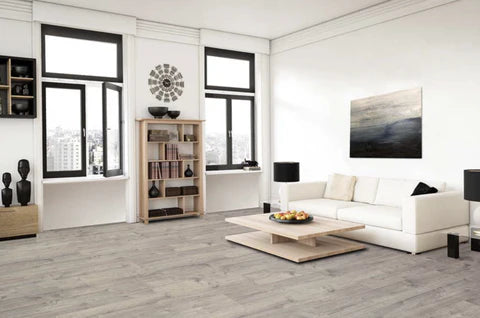
What are the top 5 reasons to choose laminate flooring?
When it comes to choosing the perfect floor covering for your home, the options can seem overwhelming. From hardwood to tile, carpet to vinyl, each type of flooring has its own set of benefits and drawbacks. However, one option that has consistently gained popularity among homeowners is laminate flooring. Laminate offers a unique blend of style, durability, and affordability, making it a top choice for many. In this blog, we will explore the top five reasons why you should choose laminate floors for your home. Whether you're renovating a single room or your entire house, these reasons will help you make an informed decision.
Cost-effective option without compromising quality
Laminate flooring stands out for its affordability, making it a budget-friendly choice for homeowners. Compared to traditional wood or stone flooring, laminate is much more affordable. However, this doesn't mean you have to compromise on quality. Modern laminate flooring is designed to replicate the stunning look and feel of natural materials like wood and stone, often so convincingly that it's hard to tell the difference. This allows homeowners to achieve the high-end look they desire without breaking the bank.
Laminate's affordability extends beyond just the initial purchase price. Installation costs are also generally lower compared to other flooring types. Many laminate floors are designed with click-lock or tongue-and-groove systems, making them easier and faster to install. This means lower labor costs if you're hiring a professional, or if you're a DIY enthusiast, you can save even more by installing it yourself.
Durability and scratch resistance for busy households
Another compelling reason to choose laminate flooring is its durability. Laminate is made of multiple layers, with a top layer that is particularly designed to resist scratches, dents, and stains. This makes it an excellent choice for high-traffic areas like living rooms, kitchens, and hallways, where the floor is more likely to be subjected to heavy use.
If you have pets or children, you'll appreciate laminate flooring's resistance to damage. Unlike hardwood, which can easily be scratched by pet claws or toys, laminate wood flooring is designed to withstand daily wear and tear. The top layer, often referred to as the wear layer, is made from a tough, transparent material that protects the design layer underneath. This ensures that your floor will look great for years, even in the busiest households.
Additionally, laminate floors are resistant to fading. This is particularly important in rooms that receive a lot of natural sunlight, as prolonged exposure to UV rays can cause some flooring materials to lose their color over time. With laminate, you can enjoy vibrant, long-lasting floors that maintain their beauty even in sunny spaces.
Wide variety of styles and designs
Laminate flooring offers an impressive selection of styles and designs, allowing you to find the perfect match for any room. Whether you prefer the look of rustic hardwood, sleek modern tile, or something in between, there is a laminate option that will meet your aesthetic preferences.
Laminate flooring is available in a range of colors, textures, and patterns, allowing you to customize the look of your home to match your personal style. For instance, if you love the look of traditional oak or maple hardwood but want a more budget-friendly option, laminate wood flooring can provide an almost identical appearance. The same goes for stone or tile looks, with laminate offering convincing alternatives to marble, slate, or ceramic.
In addition to mimicking natural materials, laminate floors are also available in unique designs that aren't typically found in nature. This gives you the freedom to create a truly custom look in your home. Whether you're going for a contemporary feel with geometric patterns or a vintage vibe with distressed wood finishes, laminate flooring offers endless possibilities for design creativity.
Easy maintenance and cleaning
In today's fast-paced world, many homeowners are looking for flooring options that are easy to maintain and keep clean. Laminate excels in this area, making it an ideal choice for those who want beautiful floors without the hassle of extensive upkeep.
Laminate flooring's smooth, sealed surface makes it resistant to dirt, dust, and allergens. This is especially beneficial for households with allergy sufferers, as it reduces the amount of allergens that can accumulate on the floor. Regular sweeping or vacuuming, combined with occasional damp mopping, is usually all that's needed to keep laminate floors looking their best.
Unlike some flooring options that require special cleaners or treatments, laminate flooring is low-maintenance. There's no need to worry about refinishing or re-sealing, as you would with hardwood floors. Additionally, spills can be easily wiped up without the risk of staining, making laminate a practical choice for kitchens, dining areas, and homes with young children.
Versatility for every room in your home
Laminate flooring's versatility is another reason it stands out as a top choice for homeowners. Thanks to its durable construction and water-resistant properties, laminate can be installed in virtually any room in your home.
For instance, laminate is an excellent flooring option for kitchens and bathrooms, where moisture is often a concern. While traditional hardwood may warp or swell when exposed to water, modern laminate floors are designed to be water-resistant, making them suitable for areas where spills or humidity are common.
Laminate flooring provides a durable and attractive solution in basements, where moisture can also be an issue. Its resistance to mold and mildew makes it a better choice than carpet, which can absorb moisture and lead to unpleasant odors and health concerns.
Laminate is also a great flooring choice for living rooms, bedrooms, and home offices. Its ability to mimic the look of natural wood or stone allows you to create a cohesive design throughout your home, while its durability ensures it will stand up to everyday use in any space.
Laminate flooring offers a unique combination of affordability, durability, style, and ease of maintenance, so it's a top choice for homeowners. Whether you're looking to update a single room or renovate your entire home, laminate floors provide a versatile and practical solution that doesn't sacrifice aesthetics for functionality.
From its cost-effectiveness to its wide variety of styles, laminate flooring has much to offer. Its impressive durability ensures it can withstand the demands of busy households, while its easy maintenance makes it a low-hassle option for any room in your home. With so many benefits, it's easy to see why laminate remains a popular flooring choice among homeowners.
- Robert Sandlin
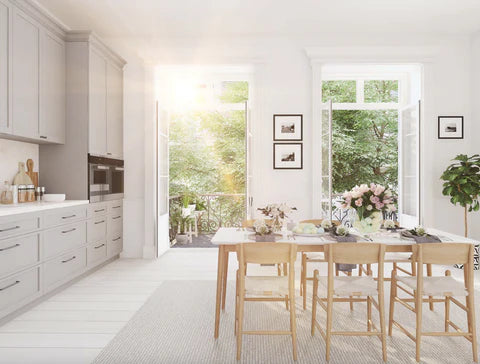
What are the best kitchen flooring options?
Selecting the right flooring for your kitchen is crucial. It's a high-traffic area prone to spills, stains, and heavy wear and tear. The right flooring not only improves the visual appeal of your kitchen but also ensures durability and ease of maintenance. In this blog, we'll explore the best kitchen flooring options, considering factors like durability, water resistance, ease of cleaning, and style.
Tile flooring: a timeless classic
Tile flooring is popular for kitchens due to its durability and versatility. It comes in various materials, such as ceramic, porcelain, and natural stone, each with its unique benefits.
Ceramic and porcelain tiles
Ceramic and porcelain tiles are known for their durability and water resistance, making them ideal for kitchen flooring. They are available in countless colors, patterns, and sizes, allowing you to create a customized appearance. Porcelain tiles, in particular, are denser and less porous than ceramic tiles, so they're more resistant to moisture and stains.
Benefits of ceramic and porcelain tiles
Durability: Both types of tiles are highly durable and can withstand heavy foot traffic.
Water resistance: Porcelain tiles, especially, offer superior water resistance.
Easy to clean: Tiles are very easy to clean and maintain, requiring only regular sweeping and occasional mopping.
Versatility: Available in numerous designs, they can mimic the look of natural stone or wood.
Natural stone tiles
Natural stone tiles, such as marble, granite, and slate, offer a luxurious and timeless appeal. They are durable and can handle the hustle and bustle of a busy kitchen. However, these floors require more maintenance than ceramic or porcelain tiles.
Benefits of natural stone tiles
Aesthetic appeal: Natural stone flooring provides a unique and elegant look that can elevate your kitchen's design.
Durability: Stone tiles are incredibly durable and can last a lifetime with proper care.
Heat resistance: They are resistant to heat, so they're perfect for kitchens where hot pots and pans are frequently used.
Vinyl flooring: affordable and resilient
Vinyl flooring has come a long way in terms of quality and design. It is an affordable and resilient option that can mimic the appearance of more expensive materials such as hardwood or stone.
Luxury vinyl planks (LVP) and tiles (LVT)
Luxury vinyl planks and tiles are a step up from traditional vinyl sheets. They offer better durability, water resistance, and a more authentic look and feel.
Benefits of luxury vinyl flooring
Waterproof: LVT and LVP flooring are waterproof, making them ideal for kitchens prone to spills.
Durability: They are designed to withstand lots of foot traffic and are resistant to scratches and dents.
Comfort: Vinyl is softer underfoot compared to tile or stone, providing more comfort during long hours of cooking.
Ease of installation: Many luxury vinyl flooring options come with click-lock installation, making them easy to install without professional help.
Hardwood flooring: warm and inviting
Hardwood flooring brings warmth and character to any kitchen. While it may not be the first choice for some due to concerns about moisture, with proper care and maintenance, hardwood can be a beautiful and durable option.
Engineered hardwood
Engineered wood flooring is more stable than solid hardwood and less susceptible to changes in humidity and temperature. It consists of a top layer of real wood over a plywood base, providing the look of hardwood with added stability.
Benefits of engineered wood flooring
Aesthetic appeal: Offers the natural beauty and warmth of wood.
Durability: More stable and less prone to warping compared to solid hardwood.
Refinishing: Can be refinished several times to restore its original look.
Solid hardwood
Solid hardwood flooring is a classic option, offering a timeless and elegant look. While it requires more maintenance and is susceptible to moisture, its charm and beauty are unmatched.
Benefits of solid hardwood
Longevity: Can last for several decades with proper care and maintenance.
Aesthetic appeal: Provides a high-end, luxurious look.
Refinishing: It can be sanded and refinished several times.
Laminate flooring: budget-friendly and stylish
Laminate flooring is an affordable alternative to hardwood that offers a similar aesthetic appeal. It is made of a photographic layer that mimics the look of wood or stone, topped with a protective wear layer.
Benefits of laminate flooring
Affordability: Less expensive than hardwood or tile.
Durability: Resistant to scratches, stains, and dents.
Easy to install: Often features click-lock installation, making it a popular DIY option.
Variety: Available in various styles and colors, allowing you to achieve the look you want.
Choosing the right kitchen flooring
When selecting the best floor covering for your kitchen, consider the following factors:
Durability: The kitchen is a high-traffic area, so choose a flooring product that can withstand heavy use. Tile, vinyl, and hardwood are all durable choices, but each has its own strengths.
Water resistance: Kitchens are prone to spills and moisture, so water resistance is crucial. Porcelain tile, vinyl, and properly sealed natural stone are excellent options for moisture-prone areas.
Ease of cleaning: Choose a kitchen flooring option that is easy to clean and maintain. Tiles, vinyl, and laminate are all low-maintenance options, while hardwood and natural stone may require more care.
Comfort: Consider the comfort of the flooring underfoot, especially if you spend long hours in the kitchen. Vinyl and cork offer more comfort compared to tile and stone.
Style and aesthetics: Select a flooring material that complements your kitchen's design and enhances its overall aesthetic. Whether you prefer the classic look of hardwood, the sleek appearance of tile, or the modern vibe of laminate, there's a flooring option to match your style.
The best flooring material for your kitchen depends on your specific needs, preferences, and budget. Ceramic and porcelain tiles provide durability and water resistance, making them ideal for high-traffic areas. Vinyl flooring provides an affordable and resilient option with a wide range of styles. Hardwood flooring adds warmth and elegance, while laminate offers a budget-friendly alternative. Cork is an eco-friendly choice that provides comfort and style.
Whether you're renovating your kitchen or building a new one, the right flooring can make a significant difference in the functionality and beauty of your space. Choose wisely and enjoy a kitchen floor that stands the test of time.
- Robert Sandlin
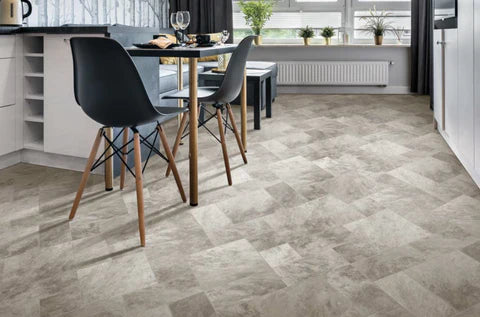
Why luxury vinyl flooring is perfect for busy households
In today's fast-paced world, busy households need flooring that is durable, easy to maintain, and stylish. Luxury vinyl flooring fits the bill perfectly, offering a blend of functionality and aesthetics that can handle the demands of active families. This blog explores why luxury vinyl plank flooring is an ideal choice for busy households.
Durability that stands up to daily wear and tear
One of the most significant benefits of LVP flooring is its exceptional durability. Unlike traditional vinyl, luxury vinyl is designed to withstand lots of foot traffic, making it perfect for busy households with kids, pets, and frequent visitors. The wear layer on top of the vinyl plank or tile protects against scratches, dents, and stains, ensuring your floor remains pristine even after years of use.
Resistance to scratches and dents: Luxury vinyl flooring is constructed with several layers that enhance its strength and resilience. The topmost wear layer is designed to resist scratches from pet claws, furniture, and other household items. Additionally, the core layer provides stability and dent resistance, making LVP flooring a robust choice for high-traffic areas like kitchens, hallways, and living rooms.
Moisture and water resistance: Another reason luxury vinyl plank flooring is perfect for busy households is its waterproof properties. Unlike hardwood, luxury vinyl can handle spills and moisture without warping or swelling. This makes it an ideal choice for bathrooms, laundry rooms, and kitchens where water exposure is common. Parents of young children will particularly appreciate this feature, as it allows for quick and easy clean-up of spills and accidents.
Easy maintenance and cleaning
Busy households need flooring that doesn't require constant upkeep. LVP flooring excels in this area, offering easy maintenance and cleaning that saves time and effort.
Simple daily care: Daily care for luxury vinyl flooring is straightforward. Routine sweeping or vacuuming to remove dust and debris, combined with occasional damp mopping, is all it takes to keep this floor covering looking its best. There's no need for specialized cleaning products or procedures, making it a hassle-free flooring option.
Stain resistance: The wear layer on luxury vinyl plank is designed to be stain-resistant, which is a huge advantage for households with children and pets. Common household spills, such as juice, wine, or pet accidents, can be easily wiped away without leaving lasting stains. This stain resistance helps maintain the floor's appearance and reduces the need for deep cleaning.
Low maintenance: Unlike natural stone or hardwood flooring, which may require periodic sealing, polishing, or refinishing, LVP flooring requires minimal maintenance. This low-maintenance aspect is a significant benefit for busy households that don't have the time or resources for extensive floor care routines.
Stylish and versatile design options
Luxury vinyl offers a stunning range of design options, allowing people to achieve the look of more expensive materials like hardwood, stone, or ceramic without the high cost or maintenance.
Realistic wood and stone looks: Modern luxury vinyl flooring is designed to replicate the beautiful appearance of natural materials closely. Advanced printing technologies and textures can replicate the look of wood grains, stone surfaces, and ceramic tiles with impressive accuracy. This means homeowners can enjoy the aesthetic appeal of these materials without the associated drawbacks.
Variety of colors and patterns: LVP flooring is available in an impressive array of colors, patterns, and styles. Whether you prefer the classic look of oak planks, the contemporary feel of gray-washed wood, or the elegance of marble tiles, there's a luxury vinyl option to suit every taste and interior design theme. This versatility makes it easy to find a flooring solution that complements your home's decor.
Ease of installation
Many luxury vinyl tile and vinyl plank flooring products feature easy installation methods, such as click-and-lock or adhesive-backed options. This can save both time and money on installation, making these floors an attractive choice for busy households looking to update their floors quickly and efficiently.
Comfort and sound absorption
Luxury vinyl flooring provides a comfortable and quiet underfoot experience, which is particularly beneficial for busy households.
Softer underfoot: Unlike hard surfaces like tile or stone, luxury vinyl flooring has a slightly cushioned feel, making it more comfortable to stand or walk on for extended periods. This is an advantage in areas where you spend a lot of time on your feet, such as kitchens or playrooms.
Noise reduction: Luxury vinyl flooring's multi-layer construction helps reduce noise, making it a quieter option than harder flooring materials. This sound absorption is beneficial in busy households where noise levels can be high, creating a more peaceful and comfortable living environment.
Cost-effective and eco-friendly
Luxury vinyl offers a cost-effective flooring solution that doesn't compromise on quality or aesthetics. Additionally, many LVP and LVT flooring products are made with environmentally friendly materials and practices.
Affordability: Compared to natural stone, hardwood, or high-end tile, luxury vinyl flooring is significantly more affordable. This makes it an excellent option for families who want a stylish and sturdy floor without breaking the bank. The cost savings extend beyond the initial purchase, as luxury vinyl's durability and low maintenance requirements reduce long-term expenses.
Eco-friendly options: Many manufacturers offer luxury vinyl tile and vinyl plank flooring products that are made with recycled materials and sustainable manufacturing processes. Additionally, luxury vinyl's long lifespan means fewer replacements and less waste over time. Choosing eco-friendly flooring options can help reduce your household's environmental footprint while still enjoying beautiful and functional flooring.
Hypoallergenic and safe for families
LVP flooring is a hypoallergenic choice, making it ideal for households with allergy sufferers or people who prioritize indoor air quality.
Minimal allergen accumulation: Luxury vinyl plank flooring does not trap dust, pollen, pet dander, or other allergens like carpet can. Its smooth surface makes it easy to clean and less likely to harbor allergens, contributing to a healthier home environment.
Safe for children and pets: Many luxury vinyl products are designed with safety in mind, featuring non-slip surfaces and being free from harmful chemicals such as phthalates. This makes this floor a safe and worry-free option for families with young children and pets.
Adaptability to various household needs
Luxury vinyl flooring's versatility makes it suitable for various areas and needs within a busy household.
Ideal for high-traffic areas: Luxury vinyl plank is particularly well-suited for high-traffic spaces like entryways, kitchens, and living rooms. Its impressive durability and resistance to wear and tear ensure it can handle the demands of daily life while maintaining its appearance.
Suitable for all room types: From bedrooms and bathrooms to basements and laundry rooms, this floor can be installed in virtually any room of the house. Its moisture resistance and ease of maintenance make it a practical choice for spaces prone to spills and humidity.
Enhancing property value
Installing LVP flooring can also enhance your property's value, so it's an attractive option for homeowners looking to invest in their homes.
Appealing to potential buyers: Luxury vinyl's combination of durability, style, and low maintenance makes it a popular choice among potential homebuyers. A well-maintained luxury vinyl floor can enhance the overall appeal of your home, potentially leading to a higher resale value.
Long-term investment: While luxury vinyl flooring is an affordable option, its long lifespan and minimal maintenance requirements make it a wise long-term investment. Homeowners can enjoy the benefits of luxury vinyl for years to come, making it a cost-effective and valuable addition to any busy household.
Luxury vinyl flooring offers a perfect combination of durability, ease of maintenance, style, and comfort, making it an ideal choice for busy households. Its resistance to scratches, dents, and moisture ensures it can withstand the demands of active family life, while its wide range of design options allows homeowners to achieve their desired look without sacrificing functionality. The cost-effectiveness and eco-friendly options further enhance its appeal, making LVP flooring a smart investment for any home. If you're looking for a flooring solution that can keep up with your busy lifestyle, luxury vinyl is the answer.
- Robert Sandlin
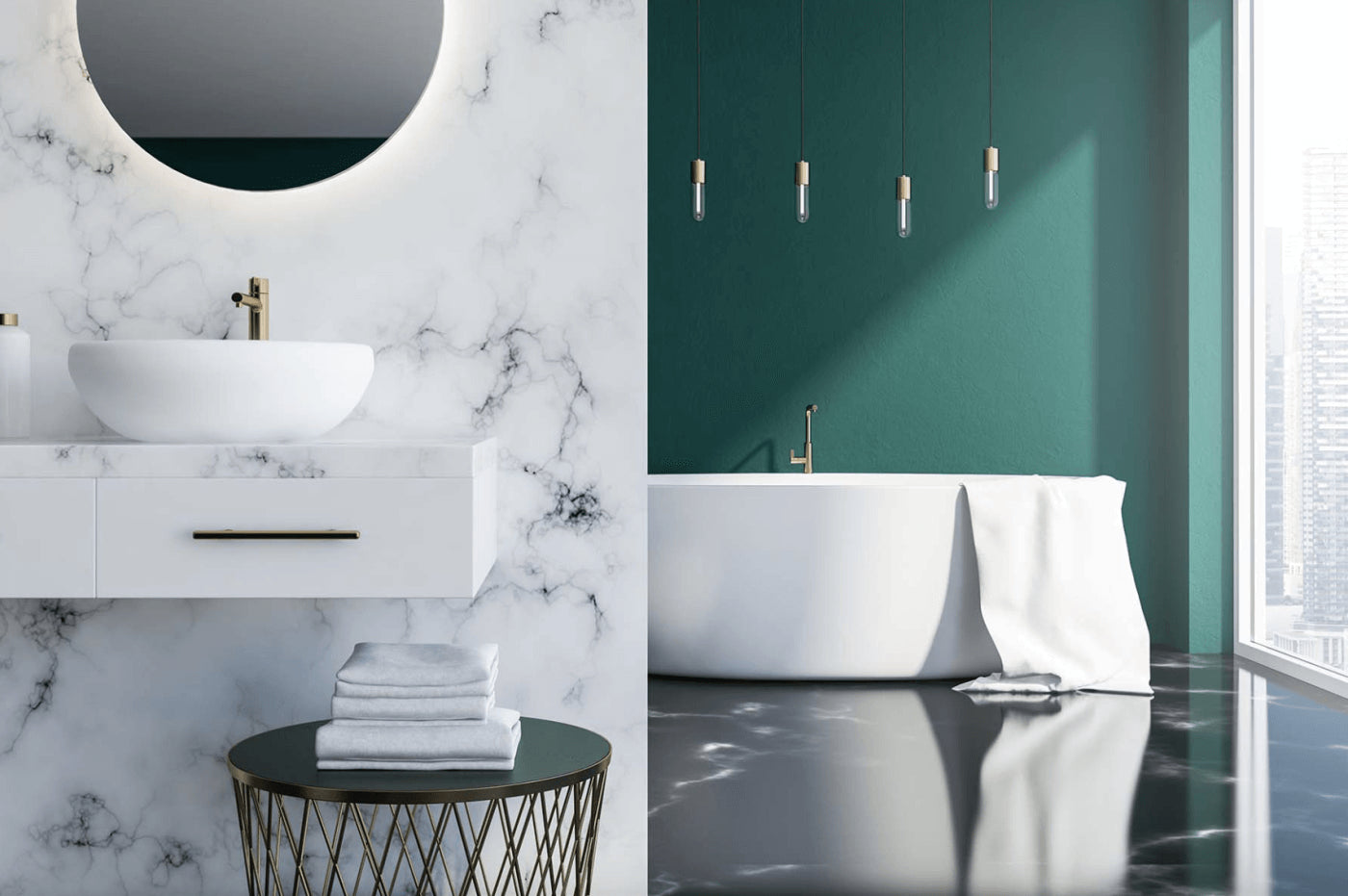
Matte vs. glossy tile flooring: choosing the perfect finish
ile flooring is popular for its impressive durability, versatility, and aesthetic appeal. But when it comes to finishes, the decision between matte and glossy can be a tough one. Both tile options offer distinct advantages and disadvantages, depending on your lifestyle, design preferences, and practical needs. In this comprehensive guide, we'll explore the world of matte and glossy tiles, exploring their characteristics, pros, cons, and ideal applications. By the end, you'll be equipped to make an informed flooring decision that perfectly aligns with your unique requirements.Understanding matte and glossy tile finishes
Before we dive into the specifics, let's clarify the fundamental difference between matte and glossy tile finishes.
Matte tile: Characterized by a smooth, non-reflective surface, matte tiles offer a subtle, understated elegance. They tend to be less slippery than their glossy counterparts, so they're a safer option for high-traffic spaces and homes with children or elderly individuals.
Glossy tile: Known for their shiny, reflective surface, glossy tiles exude a sense of luxury and sophistication. They can make a space feel larger and brighter by reflecting light. However, they can also be more prone to showing smudges, water spots, and scratches.
The pros and cons of matte tile flooring
Matte tile flooring is a popular choice for many homeowners thanks to its numerous benefits. However, like any flooring option, it has its drawbacks, too.
Pros:
Non-slip surface: Matte tiles offer better traction, reducing the risk of slips and falls, especially in wet areas like bathrooms and kitchens.
Hides imperfections: Matte surfaces are more forgiving when it comes to hiding dirt, dust, scratches, and minor imperfections.
Subtle elegance: Matte tiles create a soft, understated look that complements various design styles.
Less glare: The non-reflective surface minimizes glare, so it's ideal for rooms with plenty of natural light.
Cons:
Can show smudges: While matte tiles hide dirt well, they can sometimes reveal smudges and fingerprints more readily than glossy tiles.
Requires more cleaning effort: The textured surface of matte tiles can make them slightly more challenging to clean than glossy tiles.
Limited light reflection: In rooms with limited natural light, matte tiles might not contribute to brightening the space.
The pros and cons of glossy tile flooring
Glossy tile flooring offers a unique set of advantages that make it a compelling option for certain applications. However, it's essential to be aware of its drawbacks as well.
Pros:
Reflects light: Glossy tiles amplify light, making a room feel larger, brighter, and more open.
Easy to clean: The smooth surface repels dirt and stains, making cleaning a breeze.
Luxurious look: Glossy tiles exude a sense of luxury and sophistication, enhancing the overall aesthetic of a space.
Cons:
Shows imperfections: Glossy tiles are more likely to reveal dirt, water spots, scratches, and other imperfections.
Slippery when wet: The smooth surface can become slippery when wet, posing a potential hazard in bathrooms and kitchens.
Can be blinding: Glossy tiles can create uncomfortable glare in rooms with excessive natural light.
Choosing the right finish for your home
The best finish for your tile flooring depends on several factors, including:
Location: Consider where the tile will be installed. Matte tiles are better suited for high-traffic areas and wet zones, while glossy tiles can enhance the aesthetics of less frequently used spaces.
Lighting: If the room receives ample natural light, matte tiles can help prevent glare. In dimly lit spaces, glossy tiles can add brightness.
Design style: Matte tiles complement minimalist, rustic, and contemporary designs, while glossy tiles lend themselves to modern, glamorous, and traditional styles.
Lifestyle: If you have a busy household with children or pets, matte tiles might be a more practical choice due to their non-slip surface.
Maintenance: Consider how much time and effort you're willing to invest in cleaning. Glossy tiles are generally easier to clean than matte tiles.
Ideal applications for matte tiles
Matte tile flooring is a versatile option suitable for various applications, including:
Bathrooms: The non-slip surface makes it a safe choice for shower floors and bathroom floors in general.
Kitchens: Matte tiles can withstand heavy foot traffic and resist stains from spills and splatters.
Entryways and mudrooms: Their ability to hide dirt and grime makes them ideal for areas prone to tracking in dirt.
Outdoor patios and decks: Matte tiles offer a safer footing for outdoor spaces, especially when wet.
High-traffic areas: Their durability and scratch resistance make them suitable for hallways, living rooms, and other busy areas.
Ideal applications for glossy tiles
Glossy tiles can be used strategically to enhance specific areas of your home:
Backsplashes: Glossy tiles reflect light and add a touch of glamour to kitchen and bathroom backsplashes.
Accent walls: Create a focal point with a glossy tile accent wall in a living room or bedroom.
Powder rooms: The luxurious look of glossy tiles can elevate the aesthetic of a small powder room.
Low-traffic areas: Use glossy tiles in formal dining rooms or guest bedrooms where foot traffic is minimal.
Tips for maintaining your tile flooring
Regardless of the finish you choose, proper maintenance is critical to ensure the longevity and beauty of your tile flooring. Here are some essential tips:
Regular cleaning: Sweep or vacuum your tile floors regularly to remove dirt and debris.
Mopping: Mop your floors with a mild detergent and warm water to remove spills and stains. Avoid using harsh chemicals or abrasive cleaners that can damage the finish.
Prompt repairs: Address any chips, cracks, or loose tiles immediately to prevent further damage.
Choosing between matte and glossy tile flooring is a matter of personal preference, practicality, and design considerations. By weighing the pros and cons of each finish and considering your specific needs, you can make an informed flooring decision that will elevate the beauty and functionality of your home for years.
Remember: There's no one-size-fits-all answer. The perfect finish for you depends on your unique preferences and lifestyle.
We hope this guide has been helpful in your quest for the perfect tile flooring.
- Robert Sandlin
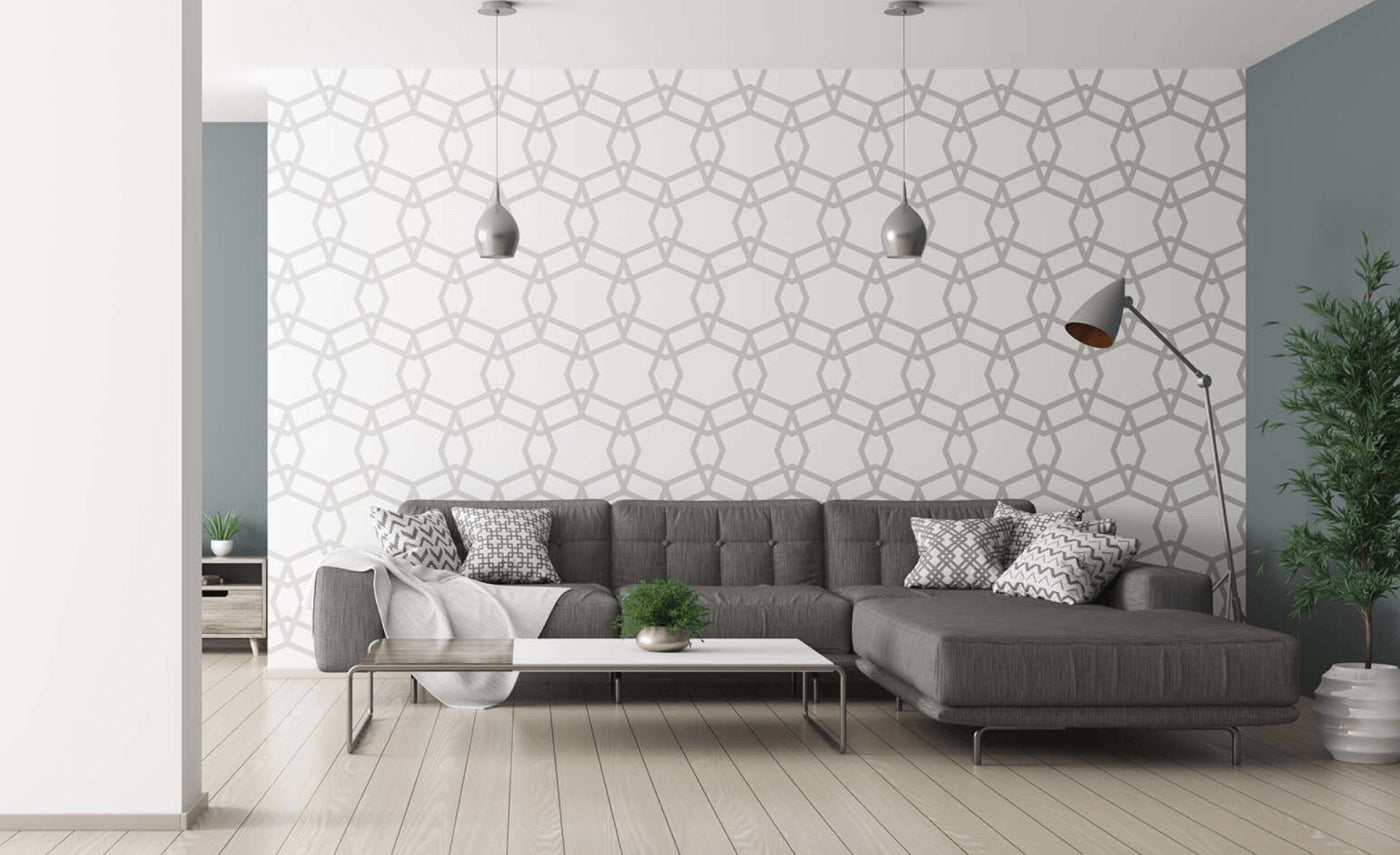
Hardwood vs. luxury vinyl plank flooring: which is right for you?
When it comes to choosing the right flooring for your home, the decision often boils down to two popular options: hardwood and luxury vinyl plank flooring. Both have their own unique set of advantages and can significantly impact the aesthetic, functionality, and value of your home. Below, we'll explore the key differences between luxury vinyl and hardwood flooring, helping you make an informed decision that best suits your needs.Introduction to hardwood and luxury vinyl flooring
Before diving into the specifics, it's crucial to understand what hardwood and luxury vinyl plank flooring are.
What is hardwood flooring?
Hardwood flooring is created from natural wood and is known for its classic beauty, durability, and ability to add value to a home. It comes in two main types: solid hardwood and engineered hardwood. Solid hardwood is made from a lone piece of wood, while engineered wood flooring has a top layer of real wood veneer attached to multiple layers of plywood.
What is luxury vinyl plank flooring?
Luxury vinyl plank flooring, often abbreviated as LVP, is a synthetic floor covering designed to replicate the look of natural wood. It is made from multiple layers, including a top wear layer, a high-definition photographic layer that mimics wood, and a core layer made from PVC for stability and waterproofing. LVP flooring has gained popularity due to its affordability, ease of installation, and versatility.
Appearance and aesthetic appeal
The visual impact of your flooring can greatly influence the overall feel of your home. Let's compare how luxury vinyl and wood floors fare in terms of appearance.
Wood flooring aesthetics
Hardwood flooring is revered for its natural beauty and rich, warm tones. Each plank is unique, featuring distinct grain patterns, knots, and variations in color. Over time, hardwood develops a patina that enhances its character and charm. This organic look is difficult to replicate with synthetic materials.
Luxury vinyl flooring aesthetics
LVP flooring has made massive strides in mimicking the appearance of hardwood. Advanced printing technologies allow luxury vinyl to replicate the grain, texture, and color variations of real wood. While it may not achieve the same level of authenticity as hardwood, many high-quality luxury vinyl plank options are convincing enough to fool even discerning eyes.
Durability and maintenance
When selecting flooring, durability and maintenance are critical factors to consider, particularly in high-traffic areas or homes with children and pets.
Durability of wood floors
Hardwood flooring is renowned for its durability, especially in solid form. It can withstand decades of use and can be refinished multiple times to restore its original luster. However, hardwood is susceptible to scratches, dents, and moisture damage, which can be a concern in homes with heavy foot traffic or in areas prone to spills and humidity.
Durability of luxury vinyl plank
Luxury vinyl flooring is highly durable and resistant to scratches, dents, and stains. Its waterproof nature makes it an excellent choice for kitchens, bathrooms, and basements. While luxury vinyl cannot be refinished like hardwood, its robust wear layer can withstand years of use before showing signs of wear.
Maintenance of hardwood floors
Maintaining wood floors involves regular sweeping or vacuuming to remove dirt and debris, along with periodic mopping using a wood-safe cleaner. Spills should be cleaned promptly to prevent staining or water damage. Hardwood floors may also require occasional refinishing to address scratches and wear.
Maintenance of LVP flooring
Luxury vinyl plank is low-maintenance and easy to clean. Regular sweeping or vacuuming, along with damp mopping using a vinyl-safe cleaner, is typically sufficient to keep it looking its best. Its resistance to moisture and stains means less worry about spills and accidents.
Cost and installation
Budget and installation considerations play a significant role in the decision-making process. Let's compare the cost and installation aspects of luxury vinyl and wood floors.
Cost of hardwood flooring
Hardwood flooring is generally more expensive than luxury vinyl, both in terms of material and installation costs. The price varies depending on the type of wood, plank size, and finish. Solid wood is typically more costly than engineered wood flooring. Installation requires professional expertise, which can add to the overall expense.
Cost of luxury vinyl plank flooring
Luxury vinyl flooring is a more budget-friendly option than hardwood. The cost varies based on the quality and brand, but it is generally less expensive than hardwood. Additionally, luxury vinyl can often be installed as a DIY project, saving on labor costs. Even when professional installation is chosen, it tends to be quicker and less costly than hardwood installation.
Environmental impact
With increasing awareness of environmental sustainability, it's important to consider the ecological footprint of your flooring choice.
Environmental impact of wood floors
Wood flooring, especially when sourced from responsibly managed forests, can be a sustainable option. It is biodegradable and can be recycled or repurposed at the end of its life cycle. However, the harvesting and processing of hardwood can have environmental impacts, and not all hardwood is sourced sustainably.
Environmental impact of LVP flooring
Vinyl plank flooring is made from synthetic materials, primarily PVC, which is derived from fossil fuels. While it is not biodegradable, many manufacturers are making strides in producing eco-friendly LVP using recycled materials and reducing VOC emissions. It's essential to choose luxury vinyl from reputable brands that prioritize environmental sustainability.
Comfort and acoustics
The comfort underfoot and acoustic properties of your flooring can affect the overall ambiance of your home.
Comfort of hardwood floors
Hardwood flooring is generally comfortable underfoot, especially when combined with area rugs or padding. However, it can be harder and colder compared to other flooring options, which might be a consideration for households seeking a warmer and softer feel.
Comfort of luxury vinyl flooring
LVP flooring offers a softer and warmer feel underfoot compared to hardwood, thanks to its resilient core. It also provides better sound insulation, reducing noise from foot traffic and impacts. This makes it a popular choice for homes with children, pets, or multi-story living.
Resale value and market perception
The impact of your flooring choice on your home's resale value and market perception is another crucial factor to consider.
Resale value of wood flooring
Hardwood is often seen as a premium feature that can increase the resale value of a home. Many buyers appreciate the timeless appeal and durability of wood flooring, making it a desirable choice for those looking to invest in their property's long-term value.
Resale value of luxury vinyl plank flooring
While luxury vinyl flooring may not carry the same cachet as hardwood, its popularity is growing due to its practical benefits and improved aesthetics. High-quality luxury vinyl can positively influence a home's resale value, especially when potential buyers are looking for low-maintenance and durable flooring options.
Making the right choice for your home
Deciding between hardwood and luxury vinyl plank flooring ultimately depends on your personal preferences, lifestyle, and budget. Here's a quick summary to help you make an informed flooring decision:
Aesthetics: Choose hardwood for its natural beauty and unique character; opt for luxury vinyl if you want a convincing wood look at a lower cost.
Durability: Hardwood is durable but requires more maintenance; LVP flooring is highly durable and low-maintenance.
Cost: Hardwood is more expensive and often requires professional installation; luxury vinyl is more budget-friendly and can be installed as a DIY project.
Environmental impact: Hardwood can be sustainable if sourced responsibly; luxury vinyl's environmental impact is improving with advancements in eco-friendly manufacturing.
Comfort: Luxury vinyl plank offers a softer and warmer feel underfoot with better sound insulation.
Resale value: Hardwood flooring can increase a home's resale value significantly; luxury vinyl is also a positive factor, especially for its practicality and durability.
Ultimately, the right choice will depend on your specific needs and priorities. If you value natural beauty and long-term investment, hardwood may be the way to go. If you seek affordability, ease of maintenance, and versatility, luxury vinyl flooring could be your best bet.
- Robert Sandlin
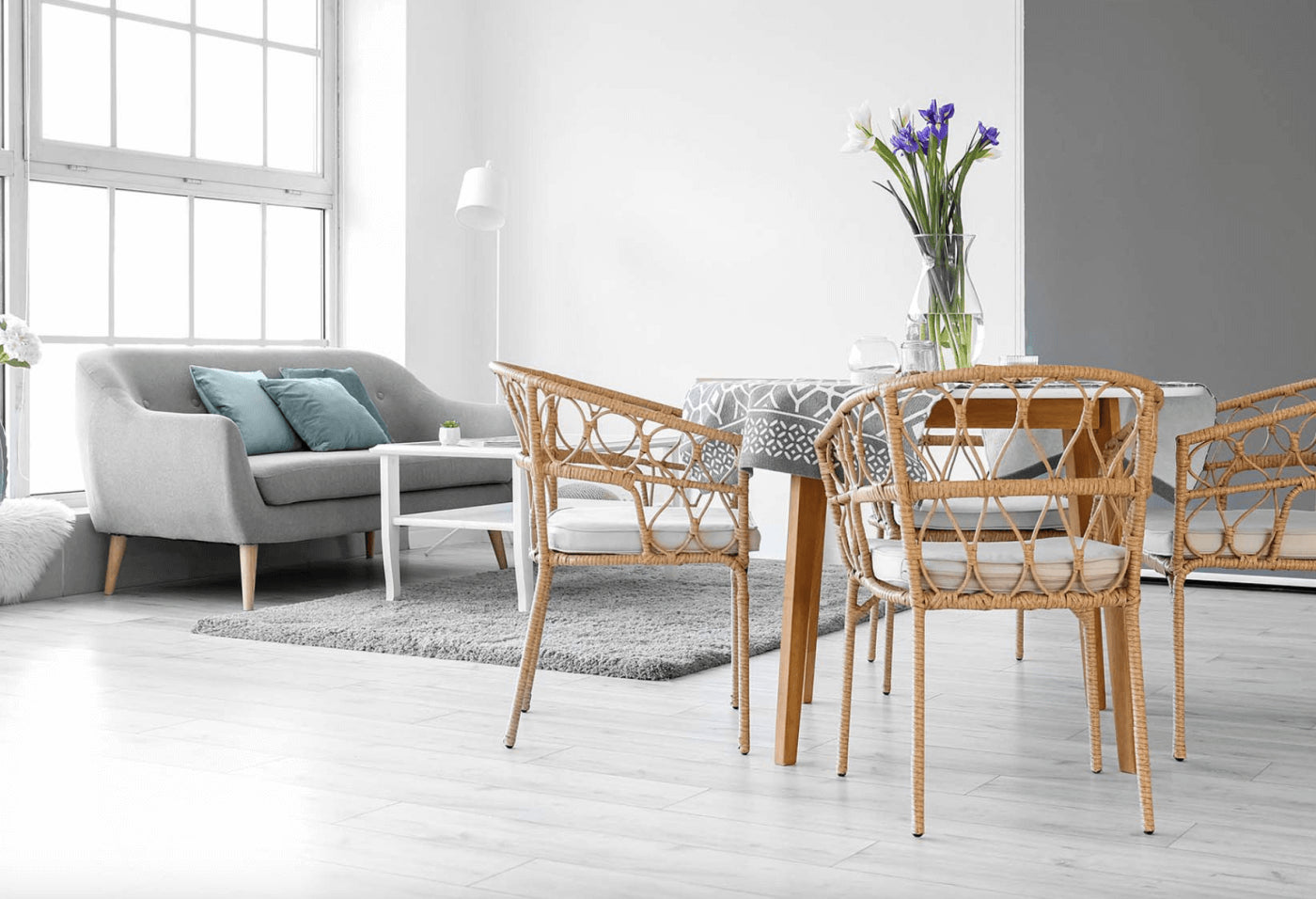
Luxury Vinyl Flooring: FAQs
Luxury vinyl flooring is one of the most popular choices for homeowners and businesses. Its durability, versatility, and affordability make it a top contender in the flooring market. If you're considering luxury vinyl floors for your space, you probably have some questions. Below, we’ll answer the most frequently asked questions about luxury vinyl flooring to help you make an informed decision.What is luxury vinyl flooring?
Luxury vinyl flooring is a type of vinyl flooring that mimics the look of natural materials such as hardwood, stone, and ceramic tile. Unlike traditional vinyl flooring, luxury vinyl is designed with a thicker, more resilient wear layer and enhanced visual design, offering a more realistic appearance and greater durability.
What are the types of luxury vinyl flooring?
There are two main types of luxury vinyl flooring: luxury vinyl plank (LVP) and luxury vinyl tile (LVT). LVP flooring mimics the look of hardwood planks, while LVT flooring replicates the appearance of stone or ceramic tiles. Both types offer a variety of styles, colors, and textures to suit any décor.
How durable is luxury vinyl flooring?
Luxury vinyl flooring is known for its outstanding durability. This floor is resistant to stains, scratches, and dents, so it's an ideal choice for high-traffic areas and homes with pets and children. The wear layer on top of the vinyl plank or tile provides additional protection, ensuring the floor maintains its appearance for years.
Is luxury vinyl flooring waterproof?
Yes, one of the standout features of luxury vinyl flooring is its waterproof nature. This makes it an excellent floor covering for moisture-prone spaces such as kitchens, bathrooms, and basements. The waterproof properties also make it easy to clean and maintain.
How is luxury vinyl flooring installed?
Luxury vinyl flooring can be installed using several methods, including:
Floating: Planks or tiles are clicked together and float over the subfloor without the need for adhesive.
Glue-down: Adhesive is applied to the subfloor, and the vinyl planks or tiles are laid on top.
Loose lay: The flooring is designed to lay flat on the subfloor without glue or clicking mechanisms, relying on its weight and friction to stay in place.
Can luxury vinyl flooring be installed over existing floors?
Yes, luxury vinyl plank flooring can often be installed over existing floors, including concrete, tile, laminate, and even hardwood, as long as the surface is clean, dry, and level. This makes this floor a convenient option for remodels and renovations.
How do I clean and maintain luxury vinyl floors?
Maintaining luxury vinyl flooring is simple. Regular sweeping or vacuuming to remove dirt and debris, combined with occasional damp mopping using a pH-neutral cleaner, will keep your floor looking its best. Avoid using harsh chemicals or abrasive cleaning tools, as they can damage the surface.
Is luxury vinyl flooring environmentally friendly?
Depending on the manufacturer, luxury vinyl flooring can be an environmentally friendly option. Many companies now offer products made with recycled materials and low VOC (volatile organic compounds) emissions, which contribute to better indoor air quality. Additionally, the impressive durability and lifespan of LVP flooring reduces the need for frequent replacements, decreasing overall waste.
How does luxury vinyl flooring compare to other flooring options?
When compared to other flooring options, luxury vinyl flooring offers a unique combination of benefits:
Hardwood: While hardwood provides a classic, natural look, it is more susceptible to scratches and moisture damage and requires more maintenance. LVP flooring offers a similar aesthetic with greater durability and ease of care.
Laminate: Laminate flooring is also a cost-effective alternative to hardwood. However, it's less durable than luxury vinyl plank flooring.
Tile: Ceramic and porcelain tiles are extremely durable and water-resistant, but they can be cold and hard underfoot. Luxury vinyl flooring provides a warmer, more comfortable surface while still offering excellent water resistance.
Can luxury vinyl flooring be used with underfloor heating?
Yes, luxury vinyl flooring is compatible with underfloor heating systems. It is important to follow the manufacturer's guidelines regarding maximum temperature and installation procedures to ensure optimal performance and longevity.
What are the design options for LVP flooring?
LVP flooring comes in many designs, colors, and textures. Whether you want the look of natural wood, stone, or abstract patterns, there is a luxury vinyl flooring option to suit your style. Advanced printing and embossing techniques create realistic textures and visuals that closely mimic natural materials.
How long does luxury vinyl flooring last?
The lifespan of luxury vinyl flooring depends on the quality of the product and the level of foot traffic it endures. High-quality LVP flooring can last 20 years or more with proper care and maintenance. Commercial-grade luxury vinyl may have an even longer lifespan due to its enhanced durability.
Is luxury vinyl flooring a good investment?
Yes, luxury vinyl flooring is considered a good investment due to its affordability, durability, and aesthetic appeal. It offers a cost-effective alternative to natural materials like hardwood and stone while providing similar visual and functional benefits. Additionally, its ease of installation and maintenance can save money over the long term.
Are there any health concerns with luxury vinyl flooring?
When selecting luxury vinyl flooring, it is important to choose products with low VOC emissions to ensure better indoor air quality. Reputable manufacturers often provide certifications for low VOC levels and use environmentally friendly materials. Always check product specifications and certifications before purchasing.
How much does luxury vinyl flooring cost?
The cost of luxury vinyl flooring varies based on the quality, brand, and design. Installation costs can also vary, depending on the method and complexity of the project. Despite these variables, luxury vinyl remains an affordable flooring choice compared to hardwood and tile.
What should I consider when choosing luxury vinyl flooring?
When selecting luxury vinyl flooring, consider the following factors:
Wear layer: A thicker wear layer offers better protection against scratches and stains.
Design: Select a style and color that complements your décor and personal taste.
Installation method: Consider the flooring installation process and whether you will need professional help or can do it yourself.
Warranty: Look for flooring products with a strong warranty that covers wear, staining, and other potential issues.
Can luxury vinyl flooring be repaired?
Minor scratches and scuffs on luxury vinyl plank flooring can often be repaired using touch-up kits available from manufacturers. For more significant damage, individual planks or tiles can be replaced without having to redo the entire floor. Keeping extra pieces from your original installation for future repairs is always a good idea.
Is luxury vinyl flooring acceptable for commercial use?
Yes, luxury vinyl flooring is a popular choice for commercial settings thanks to its durability, ease of maintenance, and aesthetic versatility. Commercial-grade luxury vinyl is designed to withstand heavy foot traffic and is often used in retail spaces, offices, and healthcare facilities.
Luxury vinyl flooring is a durable, versatile, and affordable flooring product that can enhance the look and functionality of any space. With a wide range of designs, easy maintenance, and excellent water resistance, it’s no wonder that luxury vinyl is a top flooring choice for residential and commercial applications. By understanding the key features and benefits of LVP flooring, you can confidently select the perfect product for your home and enjoy beautiful, long-lasting floors for years.
- Robert Sandlin






